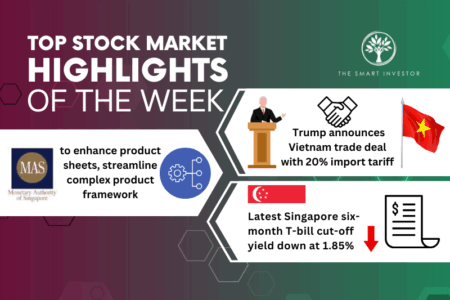The macroeconomic climate looks decidedly stormy right now. And the banks that are caught in the rain may catch a cold.
With a wide swath of industries convulsing from the pandemic-induced lockdowns, border closures and movement control restrictions, major economies are either teetering on the brink of a recession or are already experiencing one.
Singapore has not been spared the carnage.
Gross domestic product (GDP) for the second quarter plunged by 13.2% in the worst quarter on record.
The year on year GDP contraction has now been revised by the Ministry of Trade and Industry to between minus 5% and minus 7%, from a range of between minus 4% to 7% before.
As businesses face stress, these effects will trickle down to the banks who are responsible for the bulk of lending activities.
Our local banks have been hiking their provisions higher in response to increased financial stress encountered by borrowers.
Banks represent the pillars of an economy and are thus sensitive to economic downturns.
We take a look at DBS Group Holdings Ltd (SGX: D05) to assess if it qualifies as being a safe stock to own through this crisis, and over the long-term.
Adequately capitalised
One common metric used to assess if a bank was safe from financial distress is the Common Equity Tier 1 ratio or CET-1 for short.
CET-1 includes the core capital that a bank holds in its capital structure and compares this to its risk-weighted assets (RWA) to determine its ability to withstand financial crises.
The Basel III Regulations, introduced in response to the Global Financial Crisis back in 2008, stipulate that banks are required to hold a CET-1 ratio of 7% as a buffer.
For Singapore, the CET-1 regulatory minimum has been set at 9% by the Monetary Authority of Singapore (MAS).
For DBS, its CET-1 ratio stood at 13.7% as of 30 June 2020, slightly lower than the 14.1% recorded at the end of 2019.
This ratio is above both the Basel III and MAS requirements and shows that the bank is adequately capitalised and is in no danger of having insufficient capital buffer.
Minimal loan book stress
Another aspect to look at is whether DBS’ loan book is facing undue strain from a potential rash of bankruptcies and corporate collapses.
CEO Piyush Gupta is not seeing much non-performing loan (NPL) formation at this point other than for unsecured consumer credit.
The NPL ratio has remained stable at 1.5%, dipping slightly from the 1.6% recorded in the previous quarter.
General provisions have been raised by 50% year on year to S$3.8 billion to guard against unforeseen credit deterioration once government support measures taper on from this quarter onwards.
These provisions exceed MAS requirements by 24%, underscoring the bank’s conservatism as it navigates this unprecedented crisis.
Higher fee income
Even as net interest income tumbled in the wake of lower net interest margins, this was offset by higher non-interest income.
Wealth management fee has rebounded strongly, going back to pre-COVID-19 levels in June and July.
Trading also saw a strong quarter with S$500 million of trading income, when a normal quarter would see around S$225 million.
These alternative sources of revenue help to buffer the fall in net interest income for the bank, allowing it to hold up well during tough times.
Ability to pay out more dividends
One sore point with investors is how DBS was called on by MAS to limit its dividend payments for prudence sake.
As a result, the bank declared a quarterly dividend of S$0.18 per share for the second quarter, down from the S$0.33 that was declared in the first quarter.
However, in a conference call with buy-side analysts, CEO Gupta admitted that the bank would have been able to maintain the dividend (at S$0.33) if not for the call by MAS.
If events follow current expectations set by the bank, it can raise dividends in 2021.
These comments show that the bank has more than sufficient capital to pay out a dividend, but is now boosting its reserves even further due to MAS’ requirement.
This move significantly boosts DBS’ capability to weather the crisis.
Get Smart: Resilience during crises
The above demonstrates that DBS is a bastion of stability during this pandemic.
Not only has the bank maintained an adequate buffer with its high CET-1 ratio, but it has also drawn up provisions to account for potential bad loans in the coming quarters.
With its strong market position and ability to raise dividends once the crisis has abated, I conclude that the bank is a safe stock to own during these volatile times.
With share prices battered to multi-year lows, many attractive investment opportunities have emerged. In a special FREE report, we show you 3 stocks that we think will be suitable for our portfolio. Simply click here to scoop up your FREE copy… before the next stock market rally.
Click here to like and follow us on Facebook, here for our Instagram group and here for our Telegram group.
Disclaimer: Royston Yang owns shares in DBS Group Holdings Ltd.




